- Home
- Justin Bell
Zero Hour_Thrilling Post-Apocalyptic Survival Series Page 7
Zero Hour_Thrilling Post-Apocalyptic Survival Series Read online
Page 7
Reeves looked back at the screen, undecided on how to answer the question. The Team Ten command center was buried within a sub-basement level on the Fort Detrick campus, a state of the art facility designed nearly a decade previously and successfully kept up to date through a series of black book defense budget programs. Although the colonel wasn’t with Team Ten full time, he was a special operations liaison with the organization. In the event that the team was dispatched he took over command at headquarters to coordinate their operations from afar.
On the television screen, the reporter ducked her head slightly, touching the earpiece with two fingers. She appeared to listen for just a moment, the fluttering flicker of flame in the darkness just over her left shoulder. Hearing what she needed to hear, she looked back at the camera.
“We are hearing reports that the United States Military has instituted Martial Law in the city of Boston tonight. With local emergency departments tasked with response to the various emergencies, the National Guard and United States Army have been dispatched to the scene, and in fact, have already arrived.”
Colonel Reeves shook his head.
“If anyone from Boston and the surrounding areas is listening to this broadcast, please be advised that a mandatory curfew has been put in place by the federal government. Anyone found out on the streets after eight o’clock tonight will be subject to incarceration. Boston is in an active state of emergency the likes of which has never been seen.”
“Sounds nasty,” Hayes said, looking over at the screen. “We sent our team into that?”
“We did, Lieutenant Hayes, and I’d do it again. We have reason to believe there could be a targeted bioweapon attack happening right this very moment. This is precisely what Team Ten was designed to handle. It’s what we’re here for. They are exactly where they should be right now.”
“Hopefully the Army and National Guard know they’re the good guys,” Hayes said quietly.
Reeves squinted at another one of the screens on the wall ahead, quickly muting the one he was watching and unmuting the other. It was the on-screen headline that caught his eye.
“—officials are unsure of the cause, but here in Southern New Hampshire, there have been many reports of people falling ill, and physicians are warning of a possible spontaneous viral contagion which has already reportedly killed several of the people afflicted, leaving many others in critical condition in hospitals throughout the state. The Department of Health is warning that medical facilities are already being overwhelmed, and emergency call centers have been flooded with voice traffic. The cause of this rumored outbreak is unknown, and local and state officials are reaching out to the proper channels as we speak to see what we can find out.”
“And thar she blows,” Reeves hissed, low and quiet. It was the news he had been waiting to hear. It had taken them a very long time to react to the supposed attack in Quincy, and deep down he suspected that they hadn’t gotten there early enough.
He looked at the top screen, the reporter from southern New Hampshire, and then looked at the middle screen, the woman just outside of Boston. Anyone looking at these two newscasts would struggle to see any sort of connection, thinking that several crises just happened to occur on the same day.
Deep down inside, however, Colonel Garrison Reeves knew that wasn’t the case, and suspected that somewhere, somehow, this was all connected, and it was going to get a whole lot worse before it got better.
***
Gray Phillips couldn’t believe what he was seeing. He’d heard the stories—sometimes he’d even believed them—but he never thought he’d see actual, living proof right before his eyes. Boston was burning down around him. His city. His home. And he had no idea why. Or at least he hadn’t known why until he saw the black helicopter coming in low over the buildings, making its slow, calculated descent into the smoldering city that had been home for his entire thirty-three years of life.
His dad had warned him about those mythical black helicopters, the secret government agencies with insidious agendas that didn’t care if innocents got caught in the crossfire. His father had spent more time in prison than out of it, and he’d met some people, he’d said. Met a bunch of people who had seen it with their own eyes.
Gray loved his dad, loved him right up until the end, and every time his father went on one of his rants Gray nodded and told him he believed him, he’d watch out for them, he’d make sure he always stayed on the right side of the law, because if those black helicopters came for you, you were just going to disappear.
Yet, here they were. Right in front of him, right in the midst of the greatest tragedy his city had ever seen, an unmarked black helicopter, sweeping in low over the buildings, angling toward Boston Common and beyond. Choking through the thick smoke, Gray ran forward. The helicopter was descending even farther, coming down south of the city.
“Are you sure about this?” shouted Javier. “What are we going to do when we catch up to it?”
“We need to check out the helicopter!” Gray insisted. “It’s a black helicopter!” As a child, Gray had tried to tell himself he’d never believe his father, he’d just been humoring him, smiling and nodding at his crazy theories, but then came September 11th. And now, here, right in his home town, the image of the aircraft fresh in his mind, his heart was racing and he found it hard to breathe, the thought of some conspiratorial group making its way into his precious city almost too much for him to wrap his head around.
“I saw it,” Gray said quickly. “You all saw it! Black helicopter. Government spooks. They’re landing over that way,” he gestured with his hand, and the other group members followed the motion. “They had the cargo door open. I saw dudes in yellow suits. They’re FEMA. I’m telling you.”
“FEMA?”
“Yeah. They’re here to make sure no witnesses come out of this place,” the words just flowed from his mouth as if spoken by his father.
“This isn’t right,” Javier replied. “Nothing about this feels right.”
“The evidence is right in front of you, Javi,” Gray barked, his eyes wide, face twisted into a grimace of rage. “This is our chance! Our chance to save our city!”
Gray spun and ran, and in spite of himself, Javier ran after him, joining the group, his heart slamming in his chest, his eyes and nose stinging with the persistent bite of stale smoke.
***
Jackson couldn’t remember how long he’d been running, he just knew his legs were cramping and his lungs clutched inside his chest, trying to gasp for whatever scraps of air they could muster amid the choking smoke of the Boston fires. He slumped backwards against the wall of the alley, drawing in a long, deep, rasping breath, letting his backpack slide from his outstretched left arm and land with a thump on the pavement. Lowering into a crouch, he unzipped the bag and stuffed the FP6 shotgun inside, the squat weapon fitting neatly next to the sheathed sword. He rummaged through the bag, looking for water or anything at all to drink, but came away empty before leaning back on his hips, half crouching and half resting against the rough brick. Breathing in huffed pants, he remained huddled there in the shadows of the alley, his eyes pressed closed against the stinging bite of the smoke and pervasive heat of scattered fires. The air itself was charred, an invisible wall of oppression sapping the strength from his muscles and dragging him toward the paved ground like there had been an increase in gravity.
He didn’t want to run anymore. He knew he’d lost his pursuers, but a nagging fear that there were others out there dug at him, and he didn’t want to be forced to pull out that shotgun again. There had been a strange, mysterious power in that moment, the feel of the weapon blowing back in his clutched hands, but he’d also been relieved when his shot went wide and high, hitting nothing but cracked plaster and dried cereal. Jackson had feared for his life, and he was sure he would have gotten past any guilty feelings, but the thought of shooting and killing someone else, no matter what the situation was, twisted his stomach into a strange spun knot. It
was a new feeling for him, a new experience, and one he wasn’t all that excited to think about.
Buildings towered over him where he crouched, tall and wide, reaching up through the choking smoke toward a moon and stars he could not see. Not for the first time, a weight settled down upon him, a feeling of intense claustrophobia. Structures, walls and people closed in around him, the city feeling far too populated with buildings and humans in spite of everything that was going on. It was the complete opposite of the world he grew up in, the world he found himself wanting to return to.
Back in Connecticut, in that little town west of Hartford, he’d so desperately wanted to go to the city. He thought urban sprawl and population and trendy coffee shops and opportunities for advancement was all he wanted out of life. That’s what all those hip television shows taught him, and what so many of his college friends were telling him. He saw their social media posts, artificial constructions of a life they wanted to share and not necessarily the lives they were actually living. The constructions had worked, at least on him. Despite his happy life with his fiancée, he was suddenly feeling like there was this whole new world he was missing out on, his advanced degree in business going to waste at the little recruiting firm in his small hometown. There was so much more to life. There had to be.
Lisa hadn’t wanted to come with him. She loved the small town, loved her family, and didn’t trust the crazed hustle and bustle of city life. But they were engaged and she wanted to please him, so they’d moved together to the tiny but astronomically expensive apartment in downtown Boston, right on the corner of trendy and upwardly mobile.
It was expensive. The city was frantic. Jackson had issues navigating the subway and keeping up with the suit and ties in his penthouse office space. He’d felt like a fish out of water but was so determined to make it work that he relentlessly told Lisa how happy he was, how accomplished he was feeling, and how this was the best decision he could have made.
His closed eyes battled against the lingering smoke, sirens continued wailing incessantly in the distance, and that strange sensation of permeable heat soaked into his skin. This had not been the best decision he could have made. Part of him wondered if it had been the worst. Lisa had left to return home, he was barely able to afford the apartment, and certainly didn’t have enough disposable income to afford all the great trendy coffee shops.
And now he was in the middle of ground zero of the strangest day of his life. For the majority of the day he’d been pushing himself onward into the city, eyes forward, tunnel vision telling himself all of those shadowed forms and rumpled shapes weren’t bodies, they couldn’t be bodies, there was simply no way that many dead bodies could be strewn all over the streets because this time of day that many people weren’t out, and if that many bodies were scattered here, how many were still in their homes or apartments?
Fishing around in his pocket, Jackson slipped the phone out and looked at the screen, trying to see if there was cellular service. The flickering diagonal slash through the LTE symbol at the top of the screen told him all he needed to know, yet he still thumbed Lisa’s phone number and let his shoulders sag, hoping that he would hear a reassuring sound. He needed to talk to her. Desperately. The screen blared at him that there was no service in his area and instructed him to make sure Airplane Mode wasn’t on.
Airplane Mode. Behind his closed eyes he saw the 737 angling down, hacking through the sprawling skyscraper and tumbling toward the ground, consumed in a gray-smoke ball of rolling jet-fuel flame. His skin crawled with gooseflesh.
Airplane Mode.
Not too far away glass shattered, a swift kick of impact, and he heard the muffled rantings of angry voices. Pushing himself to his feet he charged forward, ignoring the pain in his legs and the stinging pinch of smoke in his tired lungs.
He heard the rumbling before he saw anything, the ground under his feet rumbling with the impact of heavy vehicles. Spinning, he pushed himself back, deeper into the sidewalk, his eyes widening as the armored vehicle rolled slowly down the street past him. It was a military transport with layered armor, a long, heavy caliber weapon mounted to a turret near the front of the roof. A single figure stood tall from the turret mount, his hands clutched around the mechanism of the weapon. He glanced down at Jackson as the vehicle passed, but made no motion toward him, instead just riding along in shocked silence as the vehicle continued down the street, then veered left, vanishing behind a building.
“Is that the Army?” Jackson asked, though nobody was there to answer. Just how bad were things tonight in the city of Boston?
Waiting for a few moments for a second transport to pass, then a third, Jackson made his way across the street and a block east, heading toward his apartment. He was close now, probably ten minutes away, and all he wanted to do was to get back there. Get into some kind of safe place, lie down in a bed, and sleep for a few hours, hoping upon hope that when he woke up in the morning, this would all miraculously be fixed. An isolated event to mark in the history books, something to be remembered on an annual basis, but an event with a beginning and an end, a self-contained incident to be reflected upon with surprise and amazement at how he’d managed to survive it.
An electronics store appeared on his right, a blanket of television screens glaring out the window, all of them turned on and all of them featuring the same reporter on the outskirts of Boston. The same familiar female face who he saw almost every day, yet somehow didn’t know her name. The headline at the bottom declared “Martial Law in Boston,” and behind her well-groomed hair the darkened shadows of the skyline were highlighted in columns of dull, orange fire.
“Army patrols have begun making their way through the city of Boston tonight,” the reporter droned on in her serious tone. “In some cases they are assisting in rescue efforts, in other cases they are chasing down looters and trying to bring some semblance of order to a city in chaos.”
“Tell me something I don’t know,” Jackson said quietly.
“The looming questions right now,” she continued, “are the hows and the whys. Nobody can come up with a clear explanation of why four separate flights all crashed into the city at the same time or why in other areas of Boston train and mass transit collisions also occurred. Reports and rumors have been frantic, talking about sudden coughing attacks and spontaneous convulsions, the drivers and many of the passengers seemingly afflicted with some strange medical condition simultaneously. Word is still emerging from other areas of the country tonight as well, many of them reporting similar catastrophes, and even stranger, some sort of persistent medical condition which has struck at the heart of the American citizenship. By last estimate there could be thousands, if not hundreds of thousands dead or dying with no concrete cause or cure.”
Jackson’s eyes narrowed, his mind flashing to the vision of his own hand wiping through a streak of blood coughed up by the Cessna pilot. His stomach knotted as the vision came back to him, the traumatic nature of it lost in the recent cacophony of chaos he had been through in the hours since. He realized in that moment, that the feeling of barely avoiding certain death in a plane crash would be something that was never far from his mind, no matter what else was happening.
“Reports have come from New Hampshire, Illinois, Pennsylvania, New Jersey, New York State and many other states of similar medical conditions, with a cluster of afflicted victims in the Newark, New Jersey area. While the number of deceased is unknown, hundreds of deaths have been reported in our area alone and most officials fear that this number is destined to skyrocket in the coming days as communication in and out of Boston improves.”
The woman paused for a moment, her face twitching as if she might break out into tears. She quickly regained her composure like the professional she was, cleared her throat and opened her mouth to continue.
There was a loud snap like a taut rubber band, and all the televisions winked out, along with the streetlights above Jackson’s head. One minute there was light, the next only a dull,
obscure darkness. It took his eyes a few moments to adjust, to blink away the black and start to see shapes and vagaries within the shadows, but as things started to take shape, he moved forward, away from the electronics store and back toward where he knew his apartment was.
He hoped he could find it in the dark.
***
Broderick crouched low to the ground, the helicopter blades beating down around him, kicking up clouds of dirt and small debris, whirling it around in a sustained, miniature tornado of scattered trash. Glancing over his shoulder, he saw Chaboth standing in the cargo opening, ushering out the rest of Team Ten, Sergeant Davis hitting the pavement next, his automatic rifle level with his shoulder, feet moving in calculated unison.
Behind him spilled Smith, Felding, Provlov, Randolph, Quiver, and Irkus, the yellow-suited armed operatives leaping down from the skids, dropping a few feet onto pavement. Butch had found a section of the city vacant enough to bring the UH-60 down into a landing posture, though it was still a few miles from the actual Quincy site. As Broderick watched, thick, metallic briefcases were unloaded from the helicopter and set in even rows on the pavement until Major Chaboth finally dismounted herself, then turned to wave off the pilots. The co-pilot cocked his head and returned a mock salute as the fat nose of the helicopter lifted slightly, rising into the darkness, sweeping the dust and dirt along with it.
Team Ten waited a moment as the whipping thuds of the rotors faded into the night, becoming one in the background, mixing in with sirens and the normal noise of a city.
Even before the sounds of the rotors completely faded from their hearing, another sound covered them up, the dull roar and rumble of diesel engines, three large military transports rounding a corner, then easing to an aggressive halt in front of the loosely clutched group of yellow-clad operatives.
In the front transport, the main cannon swiveled around with a metallic whir, the gunner flipping down a pair of night vision goggles and barking over the noise.

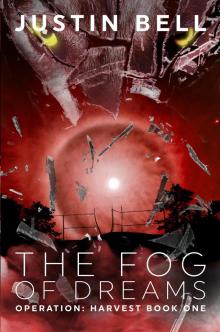 The Fog of Dreams
The Fog of Dreams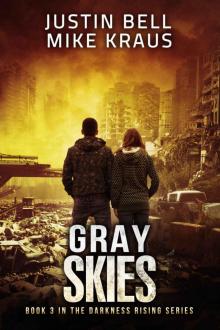 Gray Skies
Gray Skies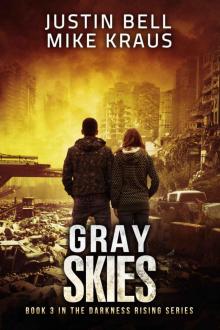 Gray Skies_the Thrilling Post-Apocalyptic Survival Series
Gray Skies_the Thrilling Post-Apocalyptic Survival Series Birth of Rebellion (War of the Three Planets Book 4)
Birth of Rebellion (War of the Three Planets Book 4)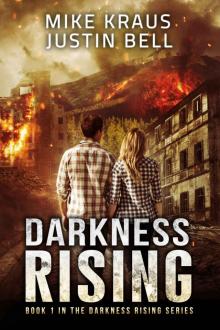 Darkness Rising
Darkness Rising Scorched Earth: Book 2 in the Thrilling Post-Apocalyptic Survival Series: (Zero Hour - Book 2)
Scorched Earth: Book 2 in the Thrilling Post-Apocalyptic Survival Series: (Zero Hour - Book 2)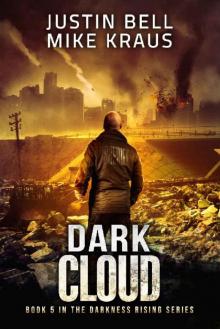 Dark Cloud: Book 5 in the Thrilling Post-Apocalyptic Survival Series: (Darkness Rising - Book 5)
Dark Cloud: Book 5 in the Thrilling Post-Apocalyptic Survival Series: (Darkness Rising - Book 5)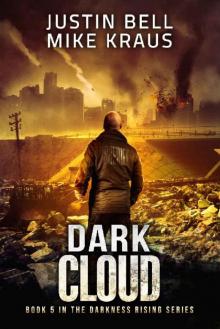 Dark Cloud_Thrilling Post-Apocalyptic Survival Series
Dark Cloud_Thrilling Post-Apocalyptic Survival Series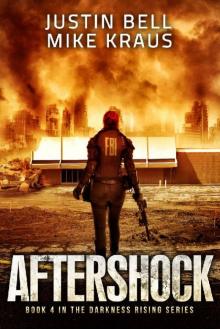 Aftershock: Book 4 in the Thrilling Post-Apocalyptic Survival Series: (Darkness Rising - Book 4)
Aftershock: Book 4 in the Thrilling Post-Apocalyptic Survival Series: (Darkness Rising - Book 4) Aftershock
Aftershock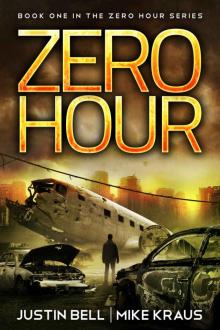 Zero Hour: Book 1 in the Thrilling Post-Apocalyptic Survival Series: (Zero Hour - Book 1)
Zero Hour: Book 1 in the Thrilling Post-Apocalyptic Survival Series: (Zero Hour - Book 1)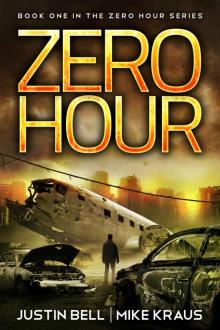 Zero Hour_Thrilling Post-Apocalyptic Survival Series
Zero Hour_Thrilling Post-Apocalyptic Survival Series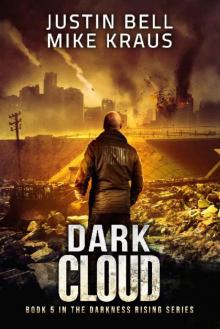 Dark Cloud
Dark Cloud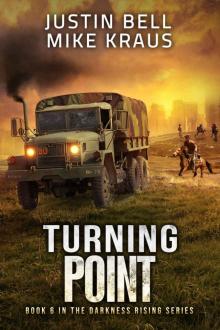 Turning Point: Book 6 in the Thrilling Post-Apocalyptic Survival Series: (Darkness Rising - Book 6)
Turning Point: Book 6 in the Thrilling Post-Apocalyptic Survival Series: (Darkness Rising - Book 6)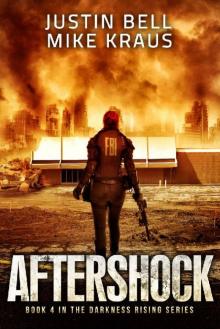 Aftershock_the Thrilling Post-Apocalyptic Survival Series
Aftershock_the Thrilling Post-Apocalyptic Survival Series War of the Three Planets Collection (Book 01)
War of the Three Planets Collection (Book 01) Stars on Fire
Stars on Fire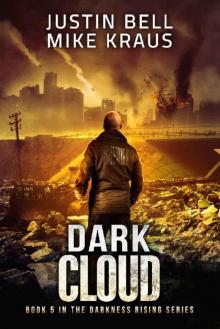 Dark Cloud_the Thrilling Post-Apocalyptic Survival Series
Dark Cloud_the Thrilling Post-Apocalyptic Survival Series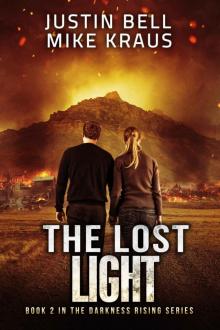 The Lost Light
The Lost Light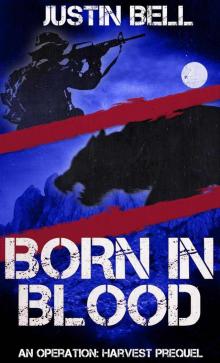 Born in Blood
Born in Blood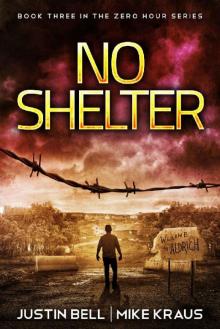 No Shelter: Book 3 in the Thrilling Post-Apocalyptic Survival Series: (Zero Hour - Book 3)
No Shelter: Book 3 in the Thrilling Post-Apocalyptic Survival Series: (Zero Hour - Book 3) Iridium Attacks
Iridium Attacks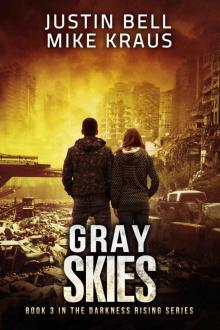 Gray Skies: Book 3 in the Thrilling Post-Apocalyptic Survival Series: (Darkness Rising - Book 3)
Gray Skies: Book 3 in the Thrilling Post-Apocalyptic Survival Series: (Darkness Rising - Book 3) It's Always Darkest
It's Always Darkest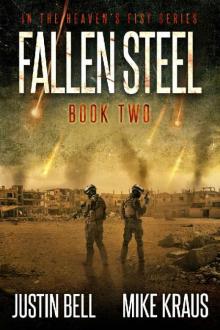 Fallen Steel: Book 2 in the Thrilling Post-Apocalyptic Survival Series: (Heaven's Fist - Book 2)
Fallen Steel: Book 2 in the Thrilling Post-Apocalyptic Survival Series: (Heaven's Fist - Book 2)